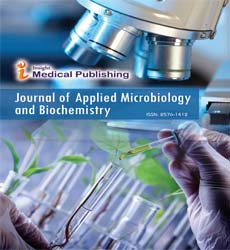ISSN : ISSN: 2576-1412
Journal of Applied Microbiology and Biochemistry
Synthetic Biology the Intersection of Applied Biochemistry and Engineering
Ali Mohammad*
Department of Molecular Medicine, Zanjan University of Medical Sciences, Zanjan, Iran
- *Corresponding Author:
- Ali Mohammad
Department of Molecular Medicine, Zanjan University of Medical Sciences, Zanjan,
Iran,
E-mail: a.mohammad@sohu.com
Received date: July 22, 2024, Manuscript No. IPJAMB-24-19677; Editor assigned date: July 25, 2024, PreQC No. IPJAMB-24-19677 (PQ); Reviewed date: August 08, 2024, QC No. IPJAMB-24-19677; Revised date: August 15, 2024, Manuscript No. IPJAMB-24-19677 (R); Published date: August 22, 2024, DOI: 10.36648/2576-1412.8.4.236
Citation: Mohammad A (2024) Synthetic Biology the Intersection of Applied Biochemistry and Engineering. J Appl Microbiol Biochem Vol.8 No.4: 236.
Description
Synthetic biology stands at the intersection of applied biochemistry and engineering, offering transformative potential across various domains. By harnessing the principles of life, researchers are developing innovative solutions to global challenges in healthcare, agriculture and environmental sustainability. While the opportunities presented by synthetic biology are vast, it is essential to navigate the associated challenges and ethical considerations responsibly. Through collaboration, transparency and public engagement, synthetic biology can fulfill its potentialof creating a better future, one that leverages the power of biology to improve the quality of life for all. As we advance in this field, the ongoing cooperation between biochemistry, engineering and societal values will shape the trajectory of synthetic biology and its impact on the world. At its core, synthetic biology seeks to redesign organisms for useful purposes by engineering their genetic material. This process involves the application of advanced techniques in biochemistry and molecular biology to manipulate DNA, RNA and proteins, enabling scientists to construct new biological functions.
Synthetic biology
Synthetic biology relies on the concept of modularity, where biological components are standardized, allowing them to be mixed and matched like LEGO blocks. These parts can include genes, promoters and ribosome binding sites, enabling the construction of complex biological circuits. Gene editing technologies tools such as CRISPR-Cas9, TALENs and zinc finger nucleases allow for precise modifications in an organism’s genome. These technologies empower researchers to insert, delete, or modify genes, facilitating the design of organisms with desired traits. The integration of computational tools is essential in synthetic biology. Bioinformatics and modeling software allow researchers to simulate biological processes, predict outcomes and optimize designs before actual implementation. This approach minimizes trial-and-error experimentation, making the engineering process more efficient. The future of synthetic biology is poised for exciting developments, driven by continuous advancements in biochemistry, engineering and computational tools. The integration of Artificial Intelligence (AI) in synthetic biology will enhance the design and optimization of biological systems. Machine learning algorithms can analyze vast datasets, predict outcomes and suggest modifications to biological circuits, accelerating the engineering process. The interdisciplinary nature of synthetic biology necessitates collaboration between biologists, engineers, computer scientists and ethicists. This collaboration will foster innovation, addressing complex challenges through diverse perspectives and expertise. As the world faces pressing issues such as climate change, food security and public health crises, synthetic biology offers innovative solutions. The continued development of sustainable practices, resilient crops and advanced medical therapies will play a vital role in creating a more sustainable future.
Applications of synthetic biology
Synthetic biology has the potential to revolutionize medicine by enabling the development of new therapies, diagnostics and vaccines. By engineering cells to recognize specific disease markers, synthetic biology facilitates the creation of personalized treatments customized to individual patients. CAR-T cell therapy involves modifying a patient’s T cells to target and destroy cancer cells more effectively. This approach exemplifies how synthetic biology can improve the specificity and effectiveness of cancer treatments. The rapid development of vaccines for emerging infectious diseases, such as COVID-19, has highlighted the power of synthetic biology. Using techniques like mRNA technology, researchers can design vaccines that instruct cells to produce viral proteins, prompting an immune response without using live pathogens. This method significantly reduces the time required to develop effective vaccines. Through genetic engineering, synthetic biology allows for the development of crops that can withstand environmental stresses, such as drought, salinity and pests. For instance, researchers have engineered crops to produce higher levels of essential nutrients, addressing global malnutrition and food security challenges. The development of bio pesticides and bio fertilizers through synthetic biology offers sustainable alternatives to chemical pesticides and fertilizers. By engineering microbes to produce natural pesticides or enhance nutrient uptake in plants, farmers can reduce their environmental impact while maintaining crop yields. Synthetic biology holds significant potential for addressing environmental challenges by creating sustainable solutions for waste management, energy production and bioremediation. Synthetic biology can be employed to engineer microorganisms capable of degrading pollutants and toxic substances in the environment. For example, bacteria can be designed to metabolize heavy metals or break down plastic waste, offering innovative solutions for pollution management. The quest for renewable energy sources has led to the exploration of synthetic biology in biofuel production. By engineering algae or bacteria to produce lipids or other hydrocarbons, researchers aim to create sustainable biofuels that can serve as alternatives to fossil fuels, reducing greenhouse gas emissions.
Open Access Journals
- Aquaculture & Veterinary Science
- Chemistry & Chemical Sciences
- Clinical Sciences
- Engineering
- General Science
- Genetics & Molecular Biology
- Health Care & Nursing
- Immunology & Microbiology
- Materials Science
- Mathematics & Physics
- Medical Sciences
- Neurology & Psychiatry
- Oncology & Cancer Science
- Pharmaceutical Sciences
